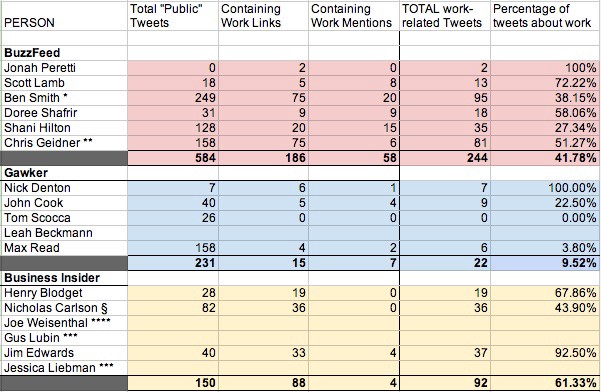How Much Do BuzzFeed, Gawker and Business Insider Staff Tweet About Work?

Is Twitter your job? We have maintained in the past that it is not. A year later, we think that more and more media employees are engaged in the practice of using their Twitter accounts to promote not just their work, but their workplaces. That’s true even with the transition of Jim Roberts from @NYTJim to @NYCJim, as he left the New York Times to become the executive editor of Reuters Digital. (His Twitter is still chock-full of Times links, though!)
How much Twitter work is working? We looked at a work-week’s worth of tweets at three publications: BuzzFeed, Gawker and Business Insider. Just how often were people promoting their workplaces?
For the five work days of last week, March 25th-29th, we used this methodology: we only counted “public-facing” tweets — leaving out conversational replies and the like. We counted three things:
• all tweets
• all tweets containing a link to any publications owned by the tweeter’s employer
• all employment-related tweets. (We erred on the side of under-inclusion here, but counted things like employees referring followers to other Twitter accounts run by the publication, such as during the launch last week of a new BuzzFeed vertical, and also some self-referential office humor.)
And we included retweets.
Let’s look at the data!

Notes:
*** Doesn’t really use Twitter, or doesn’t at all.
**** I could not review Joe Weisenthal’s Twitter, it would take me a week.
§ Spent that Friday golfing.
What did we learn?
• As a general rule, the higher up the masthead you are at a digital publication, the less you tweet.
This could mean a few different things of course. More meetings, more travel, less time to tweet. It could also mean a lack of pressure to tweet. In general it’s best not to draw conclusions from this. But the ratio of tweets by editors-in-chief or owners to executive editors and senior editors is impressive.
• The most frequent tweeter last week, unsurprisingly, and breaking that model, was BuzzFeed honcho Ben Smith.
He issued 249 public-facing tweets in five days. With that much volume, however, only 38% of his tweets were about work, and he linked to a diverse array of sources as well. Still, with that volume, he easily tweets 18 or 20 links to BuzzFeed a day. Although, to be fair, having to not include Business Insider’s Twitter-monster Joe Weisenthal may make this a hollow victory.
• Owners tweet less but link much more.
Gawker owner Nick Denton and BuzzFeed CEO Jonah Peretti tweeted more infrequently than average last week. But each managed to have 100% of their public-facing tweets be about their publications. (And nearly all were links: in one single Tweet, of Denton’s, he conveyed not a link but a reference to a publication). Henry Blodget only linked to Business Insider in 67% of his tweets — but he tweeted significantly more than the other two.
• Business Insider takes work-tweeting very seriously…
In general, Business Insider — which has a somewhat smaller sample size here — had a significantly higher ratio of publication promotion than Gawker and BuzzFeed. Nearly 2/3rds — more than 3/5ths — of Business Insider tweets contained links to the publications.
• … while Gawker does not.
Gawker’s top masthead — Nick Denton, plus that publication’s editor-in-chief, deputy editor, associate editor and news editor — only contained Gawker-related links or conversation just fewer than 1 in 10 times. When Denton’s 100% twitter ratio is removed, however, that percentage drops to 8.77%. (That’s even despite Gawker editor John Cook’s fairly decent 22% Gawker-related tweet ratio.)
• Strange synchronicities.
Gawker’s news editor Max Read and BuzzFeed’s senior politics and legal report Chris Geidner issued the exact same number of public-facing tweets last work-week: 158 each. But their approach was markedly different. Geidner tweeted links to BuzzFeed stories an astonishing 75 times. That’s fifteen each day. Max Read tweeted four links to Gawker — in total. #YOLO
• What does it all mean?
Quite possibly nothing! Employees with lots of Twitter followers are valuable to publications, obviously. Employees who know how to tweet are as well. Sharing in general is valuable. It’s also interesting that a number of employees show up near the top of mastheads who barely tweet at all. They’re bringing other value, presumably. The outlook would be a lot more disturbing if 100% of employees were tweeting work-related content regularly. That some aren’t means that we don’t yet live in a world where work performance on your “personal” twitter is mandatory, and that’s a good thing.
The full data:
